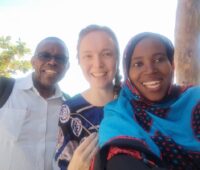Research collaborations bring together scholars with distinct positionalities, which at once enriches the research process and presents an array of power and social dynamics for team members to navigate. In this essay, Caitlyn Bolton, Mary Khatib, and Issa Ziddy provide an autoethnographic account of their joint field research in Zanzibar, reflecting on the idea of the “we” in knowledge production. The essay draws attention to previous challenges faced by team members in the Global South, the importance of time to developing solid connections between researchers, and the value of friendship as a methodology.













